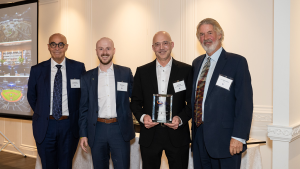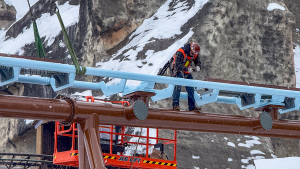The new chair of the Toronto Construction Association (TCA) says helping member businesses survive is and will always be a top priority.
“Our main focus is how do we help our members survive the next 12 months, or whatever it takes, and try to minimize the number of contractors or members who are being adversely impacted by COVID,” said Jeff Murva. “We want all our members to survive this and come out strong enough to resume their business and that is a huge challenge.”
Murva was appointed the new chair of the TCA board of directors at the association’s annual general meeting at the end of February. With a background in engineering, Murva runs his own consulting firm J. Murva Consulting and is a development and construction consultant. He has 33 years of experience in the construction industry.
“I certainly contribute to the conversation from the perspective of somebody who has executed and provided construction services, but also has for many years been representing or been the owner procuring and receiving construction services,” Murva said about the experience he brings to the role.

He joined the TCA about 15 years ago and over the years has been involved in various committees, the board and the executive.
“It’s more about being engaged in the industry with a different title,” explained Murva, adding TCA needs to evolve as the industry’s needs change. “As chair, together with our board of directors and committee members, we will help the TCA evolve and improve its value offerings and…be a support for its membership in the industry.”
Challenges are not new to the industry, he stated.
“The industry has had many challenges before COVID such as the need to embrace technology, which is a huge challenge for our members, but also the skilled labour shortage which is already being felt,” said Murva. “Before COVID our job was to provide assistance to our members in this industry during what we consider is a new industrial revolution.”
For now, it’s all about helping members through pandemic-related challenges.
“Our members, they are determining how to deal with such things as COVID claims,” Murva said. “They are looking for new ways to deal with that and position their claims.
“Contracts are written in terms of being able to adjust for delays. They’ve never been structured to deal with the costs associated with loss of productivity, which is really what COVID is.”
TCA will also be advocating at all levels of government for financial assistance for trade contractors and others in the industry who are hurting. While the government’s wage subsidy program is helpful, it needs to continue, he said, because contractors are unique compared to other businesses.
“They are cash flow businesses. They don’t have a lot of assets,” he noted. “They can’t liquidate their assets to be able to carry them through until projects resume, or productivity goes back to where it was before. It’s exceptionally challenging for the contractors out there right now to deal with COVID and to continue to operate and survive under these conditions. At TCA we are making sure that our voice is being heard.”
The association is also advising contractors on best practices.
“We’re helping them understand what are best practices in terms of onsite protocols and procedures, new ones related to COVID, enhanced health and safety protocols and how to minimize the resulting productivity losses,” he said.
As soon as COVID does begin to ease up, TCA plans to get back to long-term goals which they have been working on for years including improving how construction is procured and particularly how owners download risk onto contractors; how to deal with the skilled labour shortage; helping members find practical, cost effective, innovative technological solutions; and expanding educational offerings and training online to make it more accessible for members.
Follow the author on Twitter @DCN_Angela.









Recent Comments
comments for this post are closed